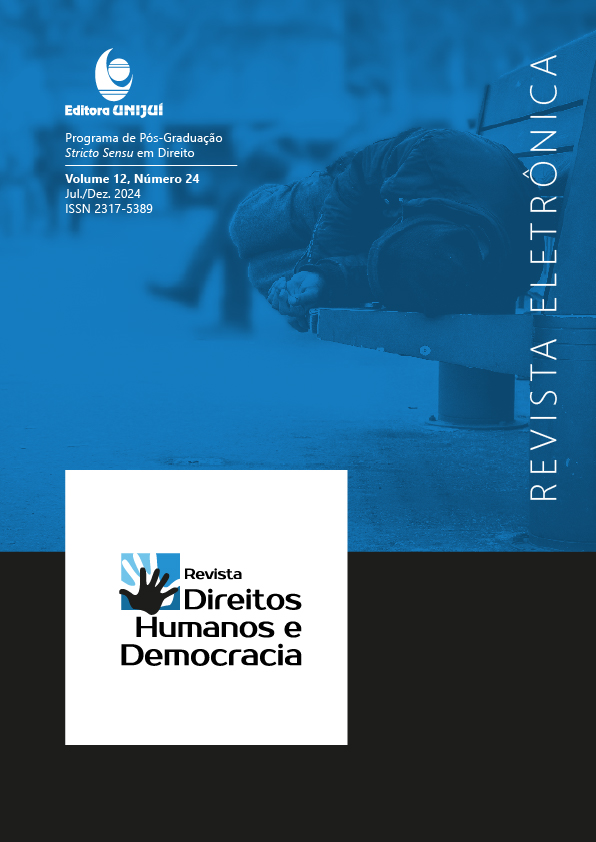No rights and no perspectives: The suffering of the category facing the precariousness of teaching labor
DOI:
https://doi.org/10.21527/2317-5389.2024.24.15933Keywords:
Human Rights, Teaching labor, Labor world, Precariousness and intensification of labor, Pedagogical laborAbstract
The text is a reflexive analysis of human rights and the work of teachers. It aims to highlight the problems that most affect the category of educators in the current world configuration of labor. To shed light on topics related to the teaching context, such as: telework, labor on digital platforms, the ‘uberization' of education, the intensification of teaching labor and the attacks of the extreme right in education, research was academically carried out to foster deep analytical reflections on human rights and the category of teaching labor. The text concludes with the need to support educators in their labor rights, reconfiguring the work environment for a healthier space that strives for collective labor, in addition to valuing the teaching career and quality public schools.
References
ANDRADE, D.; POCHMANN, M. (. ). A devastação do trabalho: a classe do labor na crise da pandemia. Brasília, DF: Grafica e Editora Positiva: CNTE, 2020.
ANTUNES, R. O privilégio da servidão: o novo proletariado de serviços na era digital. São Paulo, SP: Boitempo, 2018.
ANTUNES, R. Uberização, trabalho digital e industria 4.0. São Paulo: Boitempo, 2020.
AVANCINI, M. Pontos de atenção e recomendações na cobertura de ataques a escolas. JEDUCA, 2023. Disponivel em: <https://jeduca.org.br/noticia/pontos-de-atencao-e-recomendacoes-na-cobertura-de-ataques-a-escolas>. Acesso em: 08 jan. 2024.
BRASIL. CONSTITUIÇÃO DA REPÚBLICA FEDERATIVA DO BRASIL, 1988. Disponivel em: <https://www.planalto.gov.br/ccivil_03/constituicao/constituicao.htm>. Acesso em: 03 jan. 2023.
CATTANI, A. D.; HOLZMANN, L. Dicionáro de trabalho e tecnologia. Porto Alegre: Zouk, 2011.
COUTINHO, A. R. Educação e trabalho: uma questão de direitos humanos. In: SILVEIRA, R. M. G. Educação em direitos humanos: fundamentos teórico-metodológicos. João Pessoa, PB: Editora Universitária, 2007. p. 373 - 393.
DISTRITO FEDERAL. Pressupostos teóricos. Brasília: Governo do Distrito Federal, 2014.
DISTRITO FEDERAL. Portaria 281, 10 de junho de 2021, Brasília, 2021. Disponivel em: <https://www.educacao.df.gov.br/wp-conteudo/uploads/2021/06/protaria-281-qualidade-de-vida.pdf>. Acesso em: 03 JAN 2023.
DUTRA, R. Q.; COUTINHO, R. L. Aceleração social, uberização e pandemia: quem precisa do direito do trabalho? Revista de Direito da Universidade de Brasília, Brasília, 2020. 198 - 223.
FERRAZ, A. T. R. A extrema direita, as políticas ultraliberais e o ressurgimento do autoritarismo na América Latina. Revista Lua Nova, 2022. Disponivel em: <https://boletimluanova.org/a-extrema-direita-as-politicas-ultraliberais-e-o-ressurgimento-do-autoritarismo-na-america-latina/>. Acesso em: 13 novembro 2022.
FREITAS, L. G. et al. Trabalho e mobilização subjetiva de professores do ensino fundamental do DF. In: FREITAS, L. G. D. Trabalho, sofrimento e ação. Curitiba: CRV, 2023. p. 53 - 66.
MEDEIROS, D. M. O teletrabalho durante a pandemia da covid-19: indicadores da intensificação do trabalho docente. Revista Educação e Políticas em Debate, Brasília - DF, 2021. 1158-1171.
NOGUEIRA, A. M.. [. A. ].; ANTUNES, R. (. ). Uberização, trabalho digital e Indústria 4.0. São Paulo, SP: Boitempo, 2020.
ORGANIZAÇÃO INTERNACIONAL DO TRABALHO (OIT). Publicações da OIT. https: //www.ilo.org/brasilia/lang--pt/index.htm, 2021. Disponivel em: <https://www.ilo.org/brasilia/centro-de-informacoes/documentos/lang--pt/index.htm>. Acesso em: 06 jan. 2023.
PREVITALI, F. S.; FAGIANI, C. C. O trabalho digital e educação no Brasil. In: ANTUNES, R. Uberização, trabalho digital e industria 4.0. Sã Paulo: Boitempo, 2020. p. 217 - 235.
SALES, M. C. Civilização ou barbárie? É imperativo trabalhar com os jovens, adultos e idosos sobre o impacto do modelo político da extrema-direita na sociedade. Revista Linhas, Florianópolis - SC, 2023. 31 - 56.
SALES, M. C.; REIS, R. H. Formação profissional emancipatória: indicativos prara uma práxis libertadora. Revista Nova Paideia-Revista Interdisciplinar em Educação e Pesquisa, Brasília - DF, 2021. 131 - 145.
UNICEF. O que são direitos humanos? Convenção sobre Direitos Humanos, 2015. Disponivel em: <https://www.unicef.org/brazil/o-que-sao-direitos-humanos#:~:text=Indivisibilidade,o%20mesmo%20valor%20como%20direitos.>. Acesso em: 05 jan. 2023.
Downloads
Published
How to Cite
Issue
Section
License
Copyright (c) 2024 Human Rights and Democracy Journal

This work is licensed under a Creative Commons Attribution 4.0 International License.
By publishing in the Revista Direitos Humanos e Democracia, authors agree to the following terms:
Articles are licensed under the Creative Commons Atribuição 4.0 Internacional (CC BY 4.0), which allows:
Share — copy and redistribute the material in any medium or format;
Adapt — remix, transform, and build upon the material for any purpose, including commercial use.
These permissions are irrevocable, provided the following terms are respected:
Attribution — authors must be properly credited, with a link to the license and indication of any modifications made;
No additional restrictions — no legal or technological measures may be applied that restrict the use permitted by the license.
Notices:
The license does not apply to elements in the public domain or covered by legal exceptions.
The license does not grant all rights required for specific uses (e.g., image rights, privacy, or moral rights).
The journal is not responsible for opinions expressed in the articles, which remain the sole responsibility of the authors. The Editor, with the support of the Editorial Committee, reserves the right to suggest or request modifications when necessary.
Only original scientific articles presenting research results of interest, not previously published or simultaneously submitted to another journal with the same purpose, will be accepted.
References to trademarks or specific products are intended solely for identification purposes and do not imply any promotional endorsement by the authors or the journal.
License Agreement: Authors retain copyright over their articles and grant the Revista Direitos Humanos e Democracia the right of first publication.













